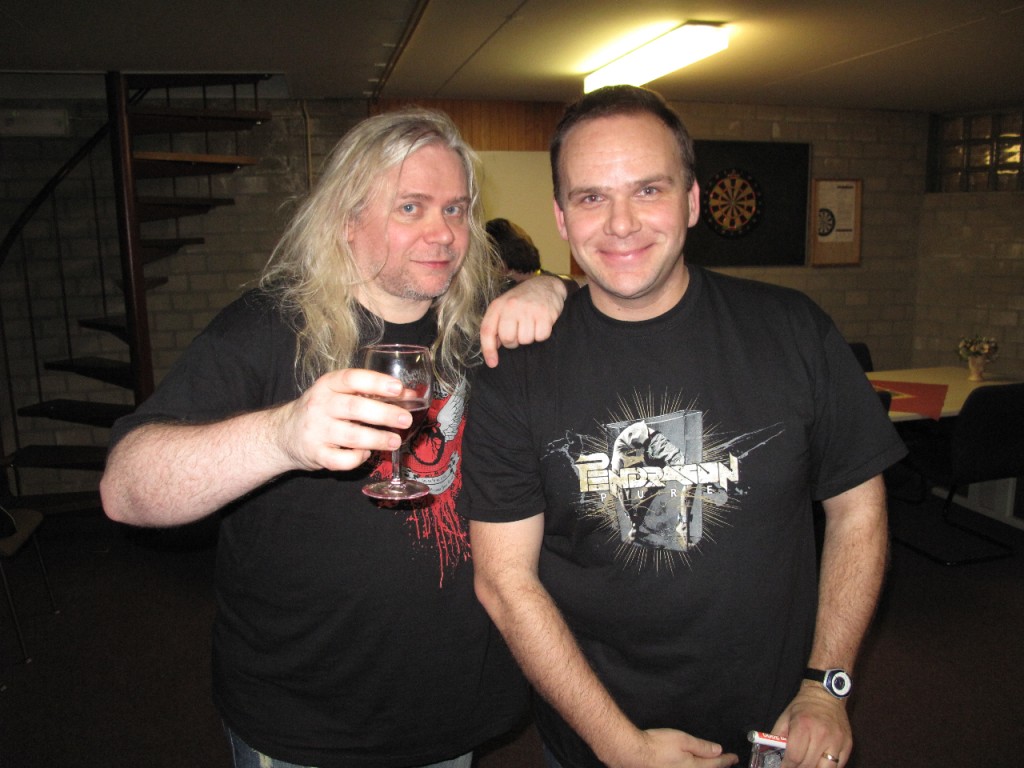THE ATTITUDE OF A PROGRESSIVE ROCK NATURE
An interview with Clive Nolan for www.Mostlypink.netby Michel Scheijen. Pictures from Clive taken by Bo Hansen,
please check out his website: bandshoot.co.uk.
Clive Nolan’s got balls! Wherever he takes place behind the keyboards, the succes isn’t far away. Pendragon, Shadowland, Strangers On A Train, Neo, and Arena already got their feet on the ground thanks to his remarkable talents. But that ain’t enough. Together with the Polish singer Agnieszka Swita he’s forming Caamora. Clive wrote the rock-opera ‘She’ for this project which is based upon Henry Rider Haggard’s famous novel. The rock-opera turned out to a full staged musical with performances in Bolivia and the UK. Currently, Clive’s working on a new musical project called ‘Alchemy’. It has got the same Victorian vibe as ‘She’, but this time the story is written by himself.
Mostlypink.net speaks to Clive before the Arena-performance at Rock Ittervoort in the Netherlands.
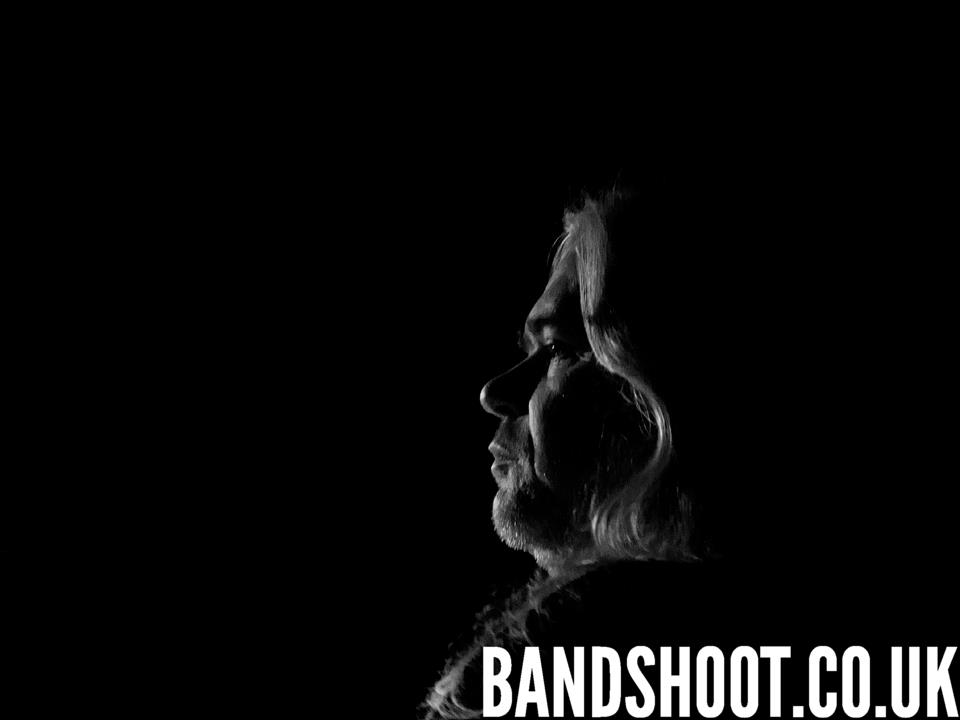
How are you?
Clive: “A little bit tired but o.k. It’s also very busy. Although we’re only doing one gig in Ittervoort we have to prepare the same work as we do for twenty gigs. It’s all very intense.”
Things are going very well for you. You were voted by the Classic Rock Society as Best Keyboard Player 2011. Also Pendragon collected three awards for Best Live Act, Best Album ‘Passion’, and Best Track ‘The Green and Pleasant Land’. How important is winning a award for you?
Clive: “It’s always nice to win something. Whatever the award is, it’s better to win something then ain’t winning something. From that point of view it’s great. Public votes are important for me particulary, because then are people taking seriously what you’re doing.”
How important are general critics to you?
Clive: “ It’s all a part of the big picture. It’s good and important if critics like what you’re doing. But over the years I’ve learned that you should not waste too much time worrying about critics. Some like what you do, some don’t . That mean’s there’s no definitive. It’s a mixed opinion. You have to decide what you’re gonna listen to. I listen to a sort of general reaction. But I refuse to decide how to write music based upon a the opinion of a famous reviewer who’s not feeling very well when he’s listening to my albums.”
You’ve said that prog or any other term isn’t important to catergorise you music. Still your music is being filed under progressive rock.
Clive: “Sometimes Arena is even described as progressive metal. A part of the reason that Arena’s filed under progressive rock is that Mick Pointer was in Marillion and I’m in Pendragon. There are all sorts of symphonic/progressive rock connections. I don’t really care what people are calling it. My only problem with it is, that somebody’s allready got a picture when he’s told that our music is progressive rock. He’s expecting Genesis or possibly Pink Floyd, epics about Hobbits, Mellotrons and that sort of stuff. That ain’t what we’re doing. The term progressive rock has become an incredible, big umbrella for all sorts of different styles of bands. Maybe we do fit into that, but I don’t think that’s all we are.”
‘She’ went from a rock-opera to a full theatric stageplay or musical. Does this culmination depend on the succes form the rock-opera or was ‘She’ planned to be a musical?
Clive: “I always wanted it to be a musical. But is was
mostly bloody mindedness that got us through to that point. I just kept on
pushing it untill we got to that point. When I wrote ‘She’ I just didn’t really
expect to go much further than recording a cd or dvd. I kept on trying to make
things happen, but I assumed it was possible that it would be the only thing
we did. After the succes of the Bolivia performance, which was a full theatric
show as well, the idea came up to try and do it in England. Because that’s what
‘She’ is intended to be; a theatric experience. I just didn’t expect it would
actually happen. Ha!Ha!Ha!”
“With ‘Alchemy’ it’s the same principal. We’re gonna make
the cd, and probably the dvd. Although I should make it more of a concert
version. Then we’ll do the Cheltenham-shows again. The target in my head for
‘Alchemy’ is the theatrical show. I’m much more aware of that finished target
when I’m writing it. I purely think of ‘Alchemy’ as a musical.”
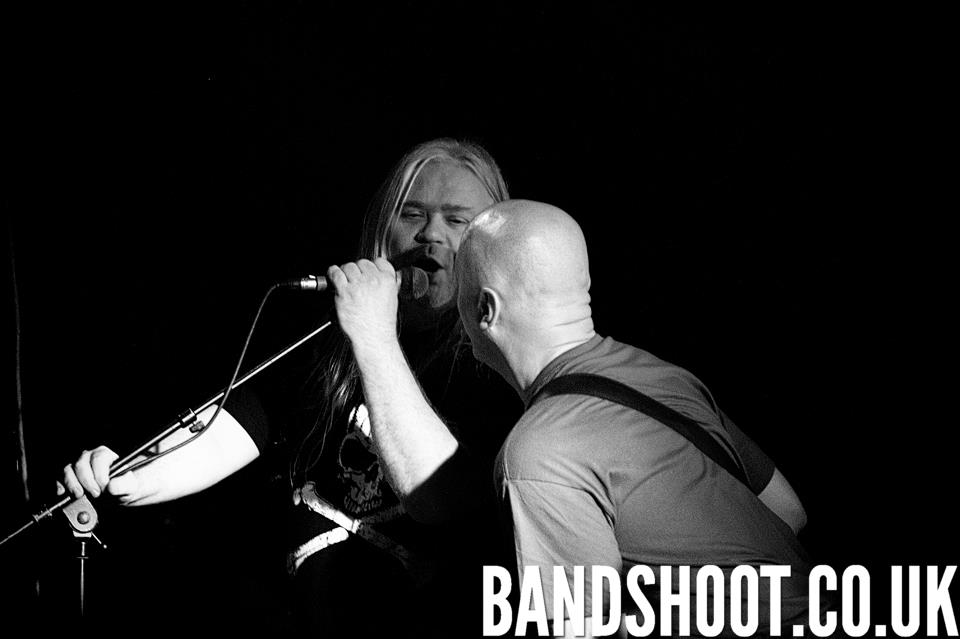
Writing a musical must be a hell of a job. Isn’t it?
Clive: “Yes, it’s hard. I want the fans to like this. It’s a though goal, because I’m expecting a lot of them. After all the Arena-, Pendragon-, Shadowland-, and Strangers On A Train-albums I suddenly want them to like musicals. People already got the picture in their head when they think of musicals. They’re imagining those Fred Astaire-movies where it’s mostly talking, and all of a sudden someone bursts into a song for no apparent reason. The beauty of a musical is that you can have spoken word, singing, and music. It could be dark, rocky, or fun. There’s no rule about that. People should try and have a bit of faith in me, as far as that’s concerned. On the other hand, I have to try and reach a new audience. Perhaps some people who don’t like progressive rock. The truth is that ‘Alchemy’ is not a a piece of progressive rock. Of course it’s written by me, and I’m involved in that genre. There are certainly a lot of elements that are familiar with it. But it’s not being written to be a progressive rock concept-album. There are no Moogs, Mellotrons or any of that kind of stuff.”
Is writing a musical, and seeing it finally performed on stage, a kind of dream come true?
Clive: “Absolutely! It was important for me to do that. I would like do to some more. Those projects are massive things, you know. Suddenly you’ve got more than fifty people involved. I’m thinking of big straight away, so there’s an awfull lot of money going around. That’s my progressive rock nature, you see. I want it to be epic, colourfull or whatever.”
Are there any particular reasons for turning the novel ‘She’ into a musical?
Clive: “I saw the movie as a child together with Nick
Barret (Pendragon). I don’t know why it affected me. It was even terrifying at
that time. Then I read the book, and I became more and more entranced by the
idea of the story. After a while it went underneath and disapeared form the
surface. The funny thing is, that it was always there. When you look a the
lyrics or song-subjects from Shadowland there are often these things about
eternal youth and the corruption of time. After meeting Agnieszka Swita, I
suddenly thought it was time to bring the ‘She’-project to live.
I had enough credibility with some record-labels, so I
could record it. I couldn’t have done it ten years earlier. Now it was the
right time to do it.”
The forthcoming music called ‘Alchemy’ is a based on a story written by yourself. Why did you choose to do that?
Clive: “After ‘She’ I decided to do another Victorian story
as a musical. After some research I discovered that all these stories were
already a musical. Even the Charles Dickens-novels.
I also couldn’t find the right kind of story that
contained certain elements that I would like to have.
Except the sequel to ‘She’, but I refused to do that.
People would think that I’m obsessed with that story. Then I made a list of
important elements, and wrote my own story. “
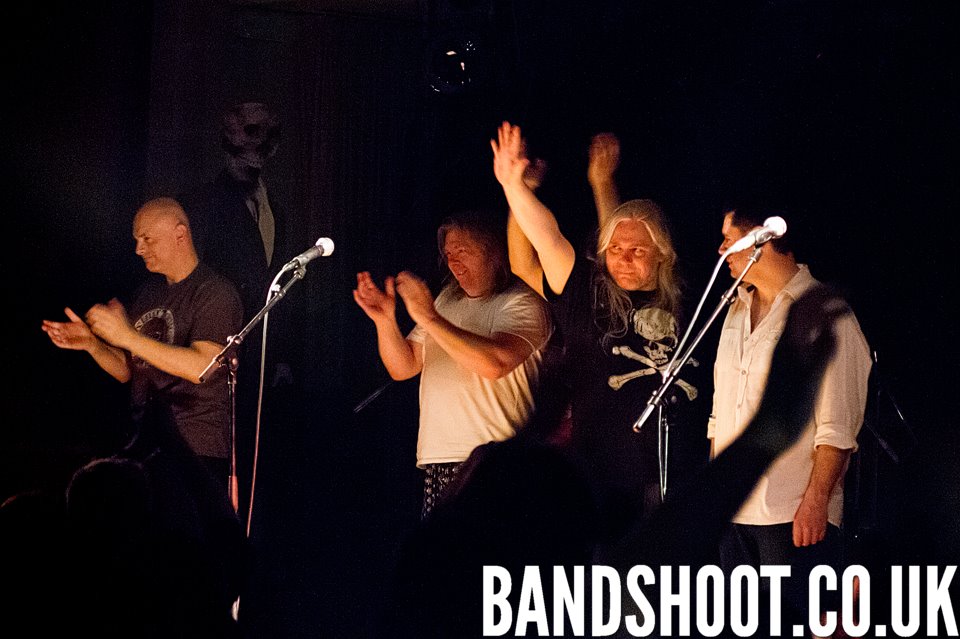
Will ‘Alchemy’ be performed with the same people who also were involved with ‘She’?
Clive: “No. For example Alan Reed and Christina Booth aren’t involved. I would love to have them in it, but I wanted a kind of change for some of the characters around. Initially I was gonna have a completely different set of people. ‘Alchemy’ contains eleven characters. Six of them are fairly substantial and the other five are small cameo parts. The musicians are the team that I like to work with, and they are all the same. Also Agnieszka will be involved”.
What’s the main difference between writing for Arena/Shadowland and writing a musical?
Clive: “One of the main differences is that I’m categorically writing on my own. In Arena there’s a combination of Mick Pointer, John Mitchell and me. It has to pass through a particular filter to be right for Arena. In Shadowland I’m also writing on my own, but there’s a different attitude to it. I would say it’s a kind of wearing the right hats. Whenever I write for a band, I don’t accidently write for somebody else. It only happened once when I was writing Caamora stuff. During the recording with Agnieszka I discovered that it was more a Shadowland-song.”
You were born and raised in a musical family. What’s the most important thing that you’ve learned from your parents?
Clive: “My father once said about music and performances that the most important thing is to have a good start and finish. What happens in the middle is up to you. Ha!Ha!Ha! In fact my parents taught me the majority of what I know. Very much the need to practise. Somethimes it’s a very boring thing, but it’s very important. Probably the most important thing my father told to me is that if I could do this as a job, I can’t go wrong.”
Could you allow yourself to do something else than music?
Clive: “My parents didn’t force me to do something in music. They even encouraged me when I wanted to do it. They spent a lot of time explaining that being a musician is a very difficult profession, and perhaps I should be thinking of something else. When I decided to do it, they gave all the help they could give. The only thing they forced me to was to have a sort of an attitude and discipline towards music”.
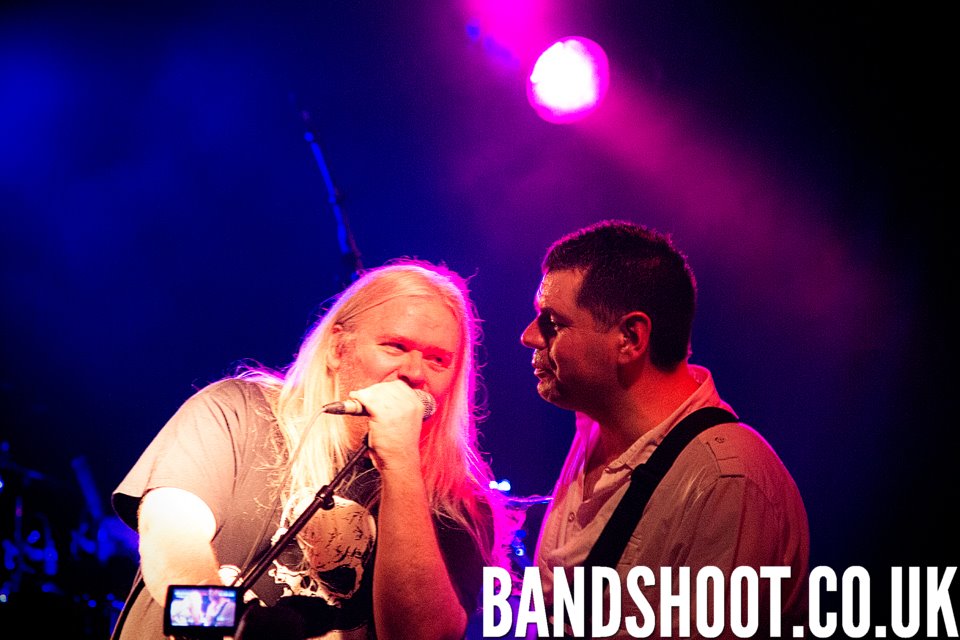
Why did you switched from violin to keyboard as a youngster?
Clive: “Actually, I never really did. Although I learned the violin and cello, I had to play the piano. Probably because my parents both were piano-teachers. With the string-instruments I started a sort of rebellion against the piano. I learned it at the age of four of five, and then I stopped. In a strange kind of way I was still playing the piano without realising it. My father used to lean over and asked me to play some chords or so. Because of still playing the piano, the switch to keyboards was a logical progression when I started playing in rockbands”.
You haven’t had the ability to play as a violinist/cellist in an orchestra?
Clive: “As a violinist I used to play in an orchestra. I absolutely loved it. I played in the Cheltenham Young People’s Orchestra and The Gloucestershire Youth Orchestra. Learning these fantastic pieces of music, and being a part of that amazing sound was a great experience. After a while I even got to conduct a little bit. At university I pursuit to conduct a little bit more”.
What’s more important in music: education or fun?
Clive: “It’s very important to have fun in making music.
You’ve got to enjoy it because of the passion.
But I also think that the more education or technique
you’ve got , the better equipped you are in what you’re doing. As a composer
you are able to understand the concept of keys, time-signatures, or whatever.
As a performer you are able to handle the instrument you’re playing. In my
opinion these element are quite serious. A lot of the musicians I work with
reach their things by trial and error. They’re unable to read music. Still they
are good musicians…sometimes…but they can save themselves an awfull lot of time
when they knew what they’re doing.”
How about the attitude of punk-muscians in the 70s?
Clive: “It’s probably something that had to be done back then. A kind of a rebellion against what was going on. It doesn’t interest me….I don’ care about it.”
What’s your advice for young, ambitious musicians these days?
Clive: ‘Dedication and passion are the things that get you there. These are the tools you need. Also you must accept the fact that succes doesn’t always happen quickly. You have to be prepared to work at it, and stick with it. Playing in front of a big audience doesn’t happen in the pub. It happens in your room when you’re rehearsing or practicing. Too many people think that such things come easily. It doesn’t!”
Finally, some short responding on these terms:
*Camille Saint-Saëns
Clive: “His ‘Dance Macabre’ was the first record I ever bought.”
*Ludwig van Beethoven
Clive: “Definitely my favorite composer. Much more than
Mozart! Beethoven was a 100% composer,
Mozart a 60% composer. In other words: Mozart has written sixty succesfull pieces, Beethoven wrote a hundered of them. I admire the man not only because of his lifestyle, but also of the fact that he wrote amazing music and was deaf. In many ways he started the whole independent thing, you know. He rebelled against a prince who told him what to write. Beethoven refused to do that, and said that only he decided what to write. He left the castle in the middle of a thunderstorm.”
*Tony Banks
Clive: “Genesis’ best melodies and moments are from Tony Banks. “
*Arena
Clive: “I’m proud of the albums we’ve made. Arena is a very volutare band, but that ‘s making it a very interesting band as well.”
*Nolan’s philosophy:
Clive: “It changes. Because I always believe that you have to keep thinking, questioning, and searching. I’m sceptical about a lot of things, but always ready to explore.”
Thanks for your time and answers, Clive!
Special thanks goes out to Domien Parren @ Rock Ittervoort.
A very special thanks goes out Magdalena ‘Magda’ Grabias @ The Caamora Theatre Company for kind interference and giving me a buzz when I just enjoyed my milkshake!
Michel Scheijen for www.mostlypink.net
Pictures from Clive taken by Bo Hansen, please check out his website with more fabulous band pictures: bandshoot.co.uk
